|
|
|
Sort Order |
|
|
|
Items / Page
|
|
|
|
|
|
|
| Srl | Item |
| 1 |
ID:
054403
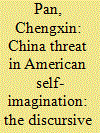

|
|
|
|
|
| Publication |
Jun-Jul 2004.
|
|
|
|
|
|
|
|
|
|
|
|
|
|
|
|
| 2 |
ID:
085500
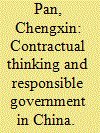

|
|
|
|
|
| Summary/Abstract |
Responsible government is often seen as contingent on democracy. Yet despite China's continued lack of notable progress in democratization, recent years have witnessed some limited moves towards responsible governance. In the absence of free elections and other institutional arrangements, how can an authoritarian regime become responsible.
|
|
|
|
|
|
|
|
|
|
|
|
|
|
|
|
| 3 |
ID:
131828
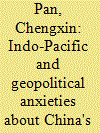

|
|
|
|
|
| Publication |
2014.
|
| Summary/Abstract |
The Indo-Pacific seems to have come of age. In a growing body of literature on this subject, the rise of India and China, as well as the ensuing great-power competition and deepening economic links across the Asia-Pacific and the Indian Ocean regions are often seen as mere (albeit new) geopolitical realities, which the term 'Indo-Pacific' can best capture. This article, however, questions the 'naturalness' of the 'Indo-Pacific' and illustrates how it is largely a product of geopolitical imaginations about the perceived 'rise of China'-imaginations that are shared among some influential observers and practitioners, particularly in the USA, Australia, Japan and India. Fuelled by their collective anxieties about China's growing influence in Asia, the 'Indo-Pacific' is not an innocent or neutral description, but is a manufactured super-region designed to hedge against a perceived Sino-centric regional order. In doing so, it is complicit in the production of great-power rivalries and regional security dilemmas. It is thus important that the 'Indo-Pacific' construct be subject to critical re-examination and re-imagination.
|
|
|
|
|
|
|
|
|
|
|
|
|
|
|
|
| 4 |
ID:
164764


|
|
|
|
|
| Summary/Abstract |
Beijing’s ambitious Belt and Road Initiative (BRI) has exacerbated a longstanding concern about the power shift from the West to China. The existing debate, however, is both motivated by, and fixated on, the strategic concerns of and about great powers (and to a lesser extent, middle powers). What is often overlooked is the concerns and voices of smaller countries and contested regions where some of the power-shift symptoms allegedly unfold, such as the South Pacific. To traditional donors such as Australia, the power dynamism in the South Pacific is largely a linear, two-way model of power shift from Western donors to Beijing. Challenging this model, this article proposes a complex, three-way model to bring small and seemingly passive actors into the power shift equation. To illustrate, the article uses Papua New Guinea’s (PNG) perceptions of China’s aid vis-à-vis Australia’s aid as a case study. Relying mostly on primary (interview) sources, this study not only reveals some nuanced attitudes of local actors toward the great-power interactions, but also highlights the hitherto neglected role and agency of Pacific Island nations and their domestic politics in the inherently complex power shifts.
|
|
|
|
|
|
|
|
|
|
|
|
|
|
|
|
| 5 |
ID:
186110
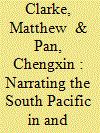

|
|
|
|
|
| Summary/Abstract |
Once considered a bunch of “small islands in a far sea” by outside powers, the South Pacific now looms increasingly large on the global geopolitical landscape, attracting the strategic attention of an array of great powers. This has prompted many scholars and commentators to focus on the rise of great power rivalry in the region. Yet, with few exceptions, the existing literature has paid little attention to how the regional dynamics are framed by the dominant narrative of great power politics in the first place and how as a result it has failed to adequately consider alternative voices, concerns and narratives from within the region. This Special Issue aims to tentatively address this neglect by questioning the unreflective narration of regional power dynamics as mere “great power politics” and by highlighting the competing narratives about this region and their policy implications for conducting relations between the South Pacific and “outside powers”. In doing so, it seeks to provide a new critical and self-reflective angle for the debate on the South Pacific. This article first examines the extent to which “great power politics” reflects the reality of the power dynamics in the South Pacific. It then explains why it is important to focus on the theme of narratives and to understand their socially constitutive role in producing knowledge and shaping reality. The third section briefly introduces the five articles in this Issue and outlines their contributions.
|
|
|
|
|
|
|
|
|
|
|
|
|
|
|
|
| 6 |
ID:
076346
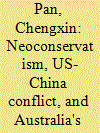

|
|
|
|
|
| Publication |
2006.
|
| Summary/Abstract |
Following its time-honoured 'great and powerful friends' foreign policy tradition, Australia has been cultivating close ties simultaneously with the United States and China. Yet, as a rivalry between the two powers apparently looms large, Australia faces an acute dilemma. While the rise of China and the question of Taiwan are often cited as main causes of US-China discord, this article argues that the American neoconservative policy on China, underpinned by a belief in both military strength and moral clarity, is integral to this growing competition and is, by extension, partly responsible for the emergence of Australia's predicament. To avoid such a difficult choice, the article suggests that Australia should strive to curb the policy influence of neoconservatism both in the United States and at home by pursuing a more independent foreign policy, making clear its strategic postures on US-China relations, and helping establish a trilateral strategic forum between Australia, the United States, and China.
|
|
|
|
|
|
|
|
|
|
|
|
|
|
|
|
| 7 |
ID:
182454
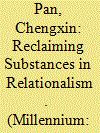

|
|
|
|
|
| Summary/Abstract |
The relational turn in International Relations (IR) has made important contributions by challenging the substantialist claim to substance/thing as ontological primitives, by drawing much-needed attention to relations as ontologically fundamental, and by introducing a diversity of relational ways of being/becoming, knowing and doing. Yet, while rightly repudiating substantialism, the relational turn has remained ambivalent about the concept of substance itself, leaving open an important question: How should we understand substance within a relational ontology? As a result, we are left with different and sometimes confusing positions on the issue of substances vis-à-vis relations. Seeing this gap as a missed opportunity for relationalism in IR, this article seeks to bring substance back in without falling back into substantialism. It draws on a quantum conception of substance via the idea of quantum holography (QH) and its related notion of whole-part duality, and stresses the little-understood dual and inseparable nature of substance-relation (‘relatance’). The concept of substance-relation duality not only enriches our relational thinking, but also allows us to engage in relational analysis through a reimagined notion of substance. To illustrate, the article turns to a substance-based relational analysis of US-China relations.
|
|
|
|
|
|
|
|
|
|
|
|
|
|
|
|
| 8 |
ID:
133966
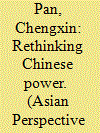

|
|
|
|
|
| Publication |
2014.
|
| Summary/Abstract |
A growing body of literature has focused on an alleged "power shift" from the United States to China (and from the West to the East more generally). For all its complexities and nuances, much of this power-shift literature continues to unreflectively hold onto a conventional way of conceptualizing power as a type of quantitatively measurable and zero-sum property possessed by the state. Without critically engaging with the conceptual question of what power means, however, the power-shift debate is both inadequate and misleading. Drawing on some alternative ways of conceptualizing power, I aim to illustrate the contingent and socially constructed nature of "Chinese" economic power and, in doing so, problematize the widely held view of a US-China power shift. I contend that insofar as power is socially constructed, how it is conceptualized matters for international relations. The need to rethink power is at the core of building a new type of major power relationship.
|
|
|
|
|
|
|
|
|
|
|
|
|
|
|
|
| 9 |
ID:
161569
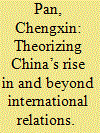

|
|
|
|
|
| Summary/Abstract |
China's rise, like the demise of the Soviet Union, is one of the defining events in the contemporary world. Yet, while the unexpected Soviet collapse and the end of the Cold War sparked the ‘Third Debate’ in International Relations (IR) theory, it is puzzling that the rise of China has yet to generate a comparable process of shell-shock and soul-searching among IR theorists. Just as the end of the Cold War is more than simply the end of a bipolar power struggle per se, so too China's rise is much more than the familiar ascendancy of another great power. Rather, it is also a complex, evolving and possibly border-traversing and paradigm-shattering phenomenon in global life that, on the one hand, requires fresh and innovative theorizing in and beyond IR and, on the other hand, potentially offers new insights for us to rethink world politics more broadly. This article introduces this Special Issue that seeks to tentatively respond to this theoretical, epistemological and ontological challenge. It draws attention to the blind spot in IR theorizing on China, and calls for deeper engagement between IR theory and China's rise that goes beyond mere ‘theory-testing’ within the existing perimeters of mainstream IR.
|
|
|
|
|
|
|
|
|
|
|
|
|
|
|
|
| 10 |
ID:
161571
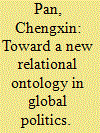

|
|
|
|
|
| Summary/Abstract |
The theoretical challenges for international relations (IR) posed by China’s rise cannot be adequately addressed at a mere theoretical level. Predicated on a Cartesian/Newtonian ontology that assumes a mechanistic world made up of discrete, self-contained parts (e.g., sovereign nation-states), mainstream IR theories offer limited understanding of China’s rise. In this article, I propose an alternative, holographic relational ontology. Drawing upon recent IR scholarship on relational ontology and holographic ideas in quantum physics as well as traditional Asian thoughts, this ‘new’ ontology posits that the world exists fundamentally as holographic relations, in which a part is a microcosmic reflection of its larger whole(s). As a part of various wholes in global politics, ‘China’ is thus never an entity in and of itself, but holographic reflections of them. Its rise is best understood as a phenomenon of holographic transition, in which characteristics of those larger wholes are being enfolded into what is known as ‘China’. Thus, both the ‘China’ challenges and ‘China’ opportunities, rather than some inherently ‘Chinese’ properties, are products of China’s holographic relations. This ontology has broader conceptual and methodological as well as policy implications for IR in East Asia and beyond.
|
|
|
|
|
|
|
|
|
|
|
|
|
|
|
|
| 11 |
ID:
172424
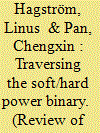

|
|
|
|
|
| Summary/Abstract |
Soft power and hard power are conceptualised in International Relations as empirically and normatively dichotomous, and practically opposite – one intangible, attractive, and legitimate, the other tangible, coercive, and less legitimate. This article critiques this binary conceptualisation, arguing that it is discursively constructed with and for the construction of Self and Other. It further demonstrates that practices commonly labelled and understood as soft power and hard power are closely interconnected. Best understood as ‘representational force’ and ‘physical force’ respectively, soft and hard power intertwine through the operation of productive and disciplinary forms of power. We illustrate this argument by analysing the Sino-Japanese dispute over the Diaoyu/Senkaku Islands. Both governments exercise representational force in constructing their respective versions of events and Self/Other. The soft/hard power binary itself plays a performative role as the Self is typically associated with soft power and the Other with hard power. The operation of productive power, moreover, privileges the attractiveness of the former and the repellence of the latter, and disciplinary power physically enforces these distinctions on subjects in both states. Finally, reinforced Self/Other distinctions legitimise preparations for violence against the Other on both sides, thus exposing how fundamentally entangled soft and hard power are in practice.
|
|
|
|
|
|
|
|
|
|
|
|
|
|
|
|
| 12 |
ID:
085952
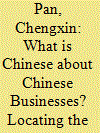

|
|
|
|
|
| Publication |
2009.
|
| Summary/Abstract |
There is an implicit but commonly held assumption that Chinese businesses are distinctively Chinese. Casting them in unitary and national terms, this assumption has often provided the underpinnings for the conception of the strength of Chinese businesses as signs of an emerging China threat. Drawing on a global production networks (GPN) approach, this paper aims to question the assumption by arguing that many Chinese businesses, embedded in the expanding global and regional production networks, have taken on important transnational characteristics. Given these transnational connections, Chinese business networks in both 'Greater China' and China proper are characterized more by diversity and fragmentation than by cultural coherence and homogeneity. This analysis of the transnationalization and fragmentation of contemporary Chinese businesses helps better understand and respond to the complex challenge posed by the economic dynamism in China.
|
|
|
|
|
|
|
|
|
|
|
|
|
|
|
|
|
|
|
|
|